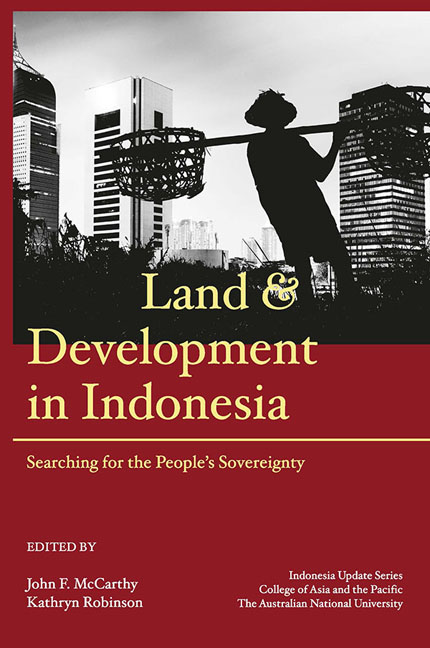Book contents
- Frontmatter
- Contents
- Tables
- Figures
- Contributors
- Acknowledgements
- Glossary
- Map
- 1 Land, economic development, social justice and environmental management in Indonesia: the search for the people's sovereignty
- PART 1 LAND USE AND LAND LAW: THE BIG PICTURE
- PART 2 ENVIRONMENTAL AND CUSTOMARY FRAMING OF LAND TENURE
- PART 3 URBAN AND INFRASTRUCTURE DEVELOPMENT
- 7 Eminent domain and infrastructure under the Yudhoyono and Widodo administrations
- 8 Housing low- and middle-income households: land development and policy practice in two Indonesian cities
- 9 Land and housing security for the urban poor
- PART 4 AGRICULTURE, LAND TENURE AND LIVELIHOODS
- PART 5 LARGE-SCALE LAND ACQUISITIONS AND SMALLHOLDER DEVELOPMENT
- Index
- Miscellaneous Endmatter
7 - Eminent domain and infrastructure under the Yudhoyono and Widodo administrations
from PART 3 - URBAN AND INFRASTRUCTURE DEVELOPMENT
Published online by Cambridge University Press: 29 July 2017
- Frontmatter
- Contents
- Tables
- Figures
- Contributors
- Acknowledgements
- Glossary
- Map
- 1 Land, economic development, social justice and environmental management in Indonesia: the search for the people's sovereignty
- PART 1 LAND USE AND LAND LAW: THE BIG PICTURE
- PART 2 ENVIRONMENTAL AND CUSTOMARY FRAMING OF LAND TENURE
- PART 3 URBAN AND INFRASTRUCTURE DEVELOPMENT
- 7 Eminent domain and infrastructure under the Yudhoyono and Widodo administrations
- 8 Housing low- and middle-income households: land development and policy practice in two Indonesian cities
- 9 Land and housing security for the urban poor
- PART 4 AGRICULTURE, LAND TENURE AND LIVELIHOODS
- PART 5 LARGE-SCALE LAND ACQUISITIONS AND SMALLHOLDER DEVELOPMENT
- Index
- Miscellaneous Endmatter
Summary
Judging by President Joko Widodo's (Jokowi's) first year in office, the former furniture salesman is committed to realising his campaign pledge of making swift strides in the improvement of Indonesia's crumbling physical infrastructure. In early 2015 he took the politically bold decision to slash billions from the government's fuel subsidies bill and spend the near entirety of these savings on infrastructure investment. In the 2015 state budget alone, Jokowi allotted a state capital expenditure fund of about Rp 290 billion, up approximately 86 per cent from the Rp 156 trillion the government of his predecessor, Susilo Bambang Yudhoyono, had budgeted (Sambijantoro 2015). This is one way in which Jokowi is striving to distinguish his administration from the sluggish performance of his predecessor's. Yudhoyono had also promised better infrastructure provision, and held an extravagant infrastructure summit less than a hundred days into his first presidency in early 2005. The summit flopped: few private firms, domestic or foreign, bid on the projects on offer and even fewer of the projects were built to completion.
In addition to increased public spending, Jokowi has been prepared to rely more heavily on the state sector and its state-owned enterprises than Yudhoyono had done. The former general had sought greater recourse to the public–private partnership (PPP) concept, a popular policy tool of the World Bank and other international financial institutions. While neoliberals prefer to pin the failure of PPP projects under Yudhoyono on government ineptitude, blame must also be apportioned to the domestic private sector for its intransigence. Firms more often than not dragged their feet in directly investing in projects for which they held the licences; some preferred rents through the flipping of these permits. In partial response, Jokowi is turning the clock back to the time before the rise of neoliberalism in the 1990s, and its championing of less state and more private sector participation in economic affairs. In the post-World War II era, a range of policy-makers—development specialists of the western powers, neoclassical economists, Marxist-oriented dependency advocates and state elites of the post-colonial world—had believed that the state was the proper entity to overcome the collective action problems of a weak capitalist class and build the roads, ports and other utilities that would induce further private investment in the generation of national industry.
- Type
- Chapter
- Information
- Land and Development in IndonesiaSearching for the People's Sovereignty, pp. 167 - 185Publisher: ISEAS–Yusof Ishak InstitutePrint publication year: 2016

